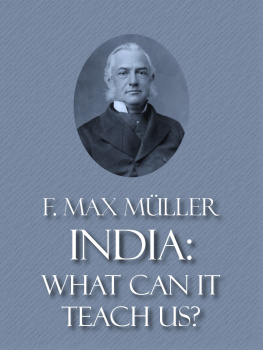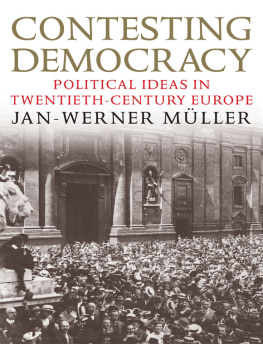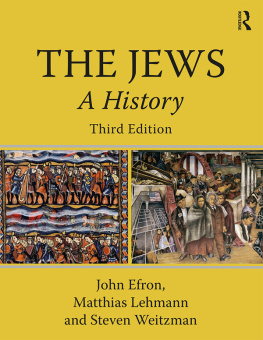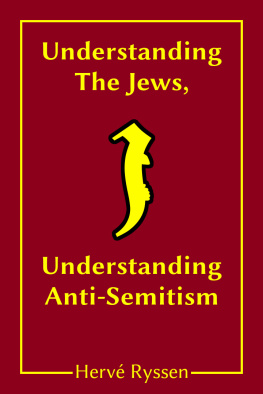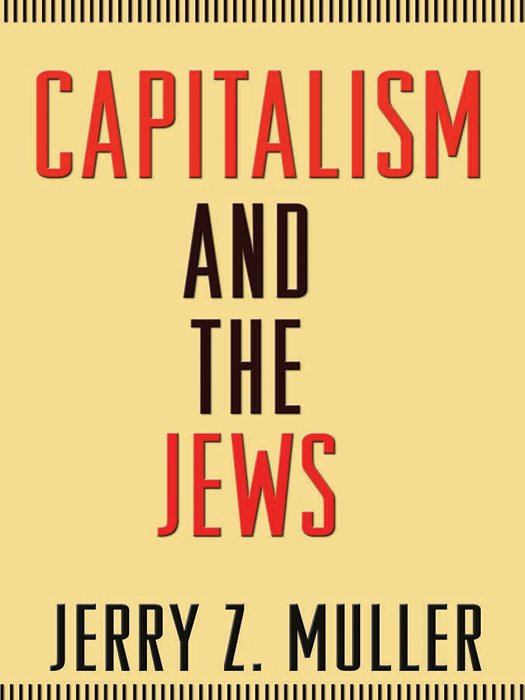JERRY Z. MULLER
Copyright 2010 by Princeton University Press Published by Princeton University Press, 41 William Street, Princeton, New Jersey 08540 In the United Kingdom: Princeton University Press, 6 Oxford Street, Woodstock, Oxfordshire OX20 1TW
STEVEN E. ASCHHEIM & STEPHEN J. WHITFIELD
CONTENTS
INTRODUCTION
T HINKING ABOUT J EWS AND C APITALISM
CHAPTER ONE
T HE L ONG S HADOW OF U SURY
Capitalism and the Jews in Modern European Thought
CHAPTER TWO
T HE J EWISH R ESPONSE TO C APITALISM
Milton Friedmans Paradox Reconsidered
CHAPTER THREE
R ADICAL A NTICAPITALISM
The Jew as Communist
CHAPTER FOUR
T HE E CONOMICS OF N ATIONALISM AND THE F ATE OF
THE J EWS IN T WENTIETH- C ENTURY E UROPE
INTRODUCTION
T HINKING ABOUT J EWS AND C APITALISM
C apitalism has been the most important force in shaping the fate of the Jews in the modern world. Of course, one could plausibly argue that it has been the most important force in shaping the fate of everyone in the modern world. But Jews have had a special relationship with capitalism, for they have been particularly good at it. Not all of them, of course. But, whenever they have been allowed to compete on an equal legal footing, they have tended to do disproportionately well. This has been a blessingand a curse.
Jews have been a conspicuous presence in the history of capitalism, both as symbol and as reality. Yet the relationship of the Jews to capitalism has received less attention than its significance merits. One reason for this relative neglect is no doubt the division of labor characteristic of modern academic research. Academic historians tend to focus on the history of a particular nation or regionwhile Jews were scattered across national and regional boundaries. The encounter of the Jews with capitalism confounds disciplinary boundaries as well: it is the stuff of economic history as well as of social history, of political history as well as cultural history, of the history of business, but also of the family and the nation-state. But there are other reasons for the relative neglect of the topic as well. Discussions of Jews and capitalism touch upon neuralgic subjects.
For Jews, Jewish economic success has long been a source of both pride and embarrassment. For centuries, Jewish economic success led anti-Semites to condemn capitalism as a form of Jewish domination and exploitation, or to attribute Jewish success to unsavory qualities of the Jews themselves. The anti-Semitic context of such discussions led Jews to downplay the reality of their economic achievementexcept ininternal conversations. Moreover, for most people, the workings of advanced capitalist economies are opaque and difficult to comprehend. When economic times are bad and people are hurting, some inevitably search for a more easily grasped, concrete target on which to pin their ill fortunes. That target has often been the Jews. Even today, some Jews regard the public discussion of Jews and capitalism as intrinsically impolitic, as if conspiratorial fantasies about Jews and money can be eliminated by prudent silence.
For economists and economic historians, the extent to which modern capitalism has been shaped by premodern cultural conceptions and cultural predispositions is a source of puzzlement at best. It simply doesnt fit into the categories in which contemporary economic historians who have adopted the armature of econometrics are predisposed to think. In recent decades, economists have added the concept of human capital to their kitbag, by which they mean the characteristics that make for economic success. But they prefer to think of it in terms of measurable criteria such as years of schooling. To the extent that human capital involves character traits and varieties of know-how that are not provided by formal education, it becomes methodologically elusive. Much of the reality of economic history, and of the Jewish role within it, is bound to elude those who proceed on the tacit premise that if you cant count it, it doesnt count.
For liberals, the reality of differential group achievement under conditions of legal equality is something of a scandal, an affront to egalitarian assumptions. For it casts a shadow of doubt on the shibboleth of equality of opportunity. If it turns out that the ability to take advantage of opportunity is deeply influenced by cultural traits transmitted in the private realm of the family and the cultural community, then inequality of outcome cannot be attributed merely to legal discrimination, nor can it be eliminated by formal, public institutions, such as schools.
For nationalists, the fact that modern nationalism had fateful consequences for the Jews precisely because the Jews were so good at capitalism was itself a source of embarrassment. In the late nineteenth and twentieth centuries, many nationalist movements sought to restrict Jewish citizenship and legal equality out of the perception (partly founded) that Jews excelled at capitalist activity compared to their non-Jewish countrymen. For many nationalists, in countries from prerevolutionary Russia, to Poland, Hungary, and Germany, the real nation was defined in good part over-and-against the Jews. When economic life was conceived of as a zero-sum game, in which the gains of some could only come at the expense of others, the gains of the Jews were made responsible for the psychic or material pains of the authentic members of the nation. The extent to which the fellow feeling between gentry, artisans, peasants, and industrial workers was forged in a shared and cultivated antipathy to the Jewish other is a part of national history that nationalists would rather forget.
For all these reasons, the exploration of Jews and capitalism has tended to be left to apologists, ideologues, and anti-Semites. This book, by contrast, tries to make sense of patterns in modern history that tend to be neglected by social scientists.
Jews were associated with trade and with the lending of money long before the rise of a recognizably modern capitalism in the seventeenth century. That association would have ongoing effects. It helps to account for the fact of disproportionate Jewish success under conditions of modern capitalism. In addition, the way in which modern, non-Jewish intellectuals thought about capitalism was often related to how they thought about Jews. Those evaluations in turn affected the ways in which Jews thought about



